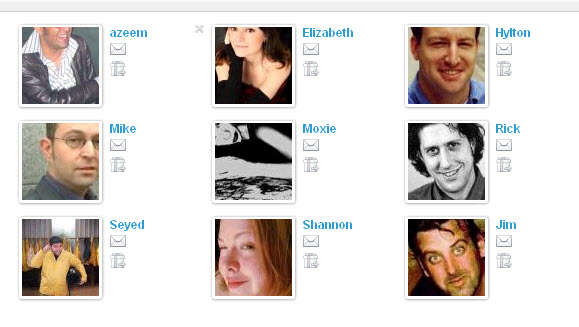
Josh Fruhlinger has been reading the daily funnies for as long as he can remember. In 2004, he launched his blog, The Comics Curmudgeon, as a way to capture a wide audience for his critiques of comicstrips ranging from Archie to Ziggy. In 2007, he appeared as a contestant on Jeopardy where he ended up in third place with a final total of $1 after incorrectly answering “Who is Dubcek” (the correct answer was Golda Meir). In addition to updating his site daily, Josh also tweets frequently, having built up a loyal following ranging from his local newspaper, @baltimoresun to fellow comics enthusiasts like @comicsaddict. Josh has lived in Buffalo, San Francisco, and Germany, but currently resides in Baltimore with his wife Amber and cat Hoagie.

Josh Fruhlinger, Owner of The Comics Curmudgeon
Q: In your “About Me” section, you say that you have been reading the daily comics every day for as long as you can remember. What made you decide to start blogging about the daily funnies?
A: I’ve been making the sorts of jokes I make on my blog kind of forever. When I was in graduate school, my roommate and I would send emails back and forth about the day’s Curtis strip or whatever. When I moved to Baltimore in 2002, the paper had all these bizarre soap opera strips (Mary Worth, Rex Morgan, etc.) that I had never seen before but which I instantly fell in love with. The immediate impetus came from my wife. I used to read the comics over breakfast with her and crack wise about them and then say “I should have a blog where I put this stuff up.” Eventually she got sick of me saying it and made me actually do it.
I also had made a couple of abortive attempts to start blogging in the early ’00s, but these were unfocused, hey-this-is-me-and-these-are-my-Important-Thoughts blogs. They flopped because they lacked direction. I do think the more laser-beam focused your blog is, the easier it is to get into the mindset necessary to write it. So, doing a comics blog was a way for me to motivate myself to do the writing that I wanted to do.
Q: How did you decide on the name “Comics Curmudgeon”? Were there any other names you considered for your blog?
When I first launched the blog in July of 2004, it was called “I Read The Comics So You Don’t Have To.” Unbeknownst to me at the time, there had been an intermittent but longrunning feature in the local Baltimore alt weekly called “Funny Paper” written by Tom Scocca (who now blogs for Slate) and Joe MacLeod that covered much of the same ground, and appeared online as well as in print; it had stopped running mere months before I started my blog. Their tagline was “We read the comics so you don’t have to,” and lots of my early readers thought that I was them, starting up in a different place.
Four or five months into my blogging career Tom Scocca wrote to me asking me to change the name, which I did, and the Comics Curmudgeon was all I could come up with on relatively short notice. At first I sort of resented it, but ultimately I’m glad I did. I sort of like having a noun as my blog title — “Josh Fruhlinger *IS* the Comics Curmudgeon!” — rather than having to me the “IRTCSYDHT guy”.
Q: Are there ever days when you have a difficult time picking something from the daily comics to blog about?
A: Sometimes, yes! I really try to do at least two a day, and sometimes it’s hard to find something funny to say other than “Boy, Funky Winkerbean sure is depressing!” Other times there’s an embarrassment of riches, of course.
One thing doing to blog every day has done for me is given me respect and sympathy for the comics artists I make fun of. It’s hard coming up with something funny to say every day. I have even less control than they do, though, since I depend on other people’s stuff to bounce off of.
Q: Do you always to stick to commenting on comics on the day they come out? In other words, are there ever days when there is such a wealth of great comics that you spread them out over two or more days?
A: The thing about the comics is that they happen every day! I don’t want to spread them out too much because who knows what the next day’s comics will bring. And actually, I like the fact that my site follows the natural rhythm of the comics section.
Q: How much time do you spend on blogging each day?
A: Depends, but it’s generally about an hour or two. The whole week’s comics actually go up all at once over the weekend, if you know where to look, so sometimes I try to spend an evening doing several days’ worth of comics in advance, so I don’t have to worry about it later. And then there’s the time spent keeping up with the commentors during the day, which happens in brief chunks.
Q: How does blogging fit in with your family life?
A: Oh, pretty well. I work at home in front of the computer so it just reads as more “work” at this point (though it’s definitely fun work!).
Q: When did you decide to run ads on your site? Did the inclusion of ads make running the site more like a second job and any less like a fun hobby?
I started running ads on the site really early in its existence — I think I put Amazon referral link ads almost as soon as I started running it, and I had BlogAds on the site by Spring of 2005, less than a year into its existence. But the first couple of years it was only a few hundred dollars a year. In 2007 the income started going up (and some of my other freelance income started going down) and I decided I had to treat it more like a job, which primarily meant that I tried to post comics every day. Before, I sometimes went days between posts; now I could afford to make time for the blog every day. I think posting daily boosted readership, which boosted income, which got me to treat it more like a job — a feedback loop.
I don’t regret this transition from hobby to job at all though! I feel very lucky to not ony entertain people but to make part of my living off of my writing. And my sense of professionalism compels me to try to do a good job, with satisfying results.
Q: You have some big-name followers on Twitter. What does Tweeting add to your blogging experience?
A: My Twitter feed isn’t just a “blog” feed — I put up links to my other work, links to things I find interesting, jokes I come up with, etc. there too. I do link to every blog post, though, and I try to put up a bonus joke when I do so it doesn’t just feel like an automated feed to readers. I sort of started as an experiment, and I was suprised to find that Twitter quickly became my #2 referring domain after Google. It’s also a quick and easy way for me to communicate with readers who tag me in a Twitter post — less intrusive and more manageable than e-mail.
Q: How often do you correspond one-on-one with your readers? Do you post regularly on the Discussion Forum on your site?
A: I do try to read all of my comments, and I probably post comments myself a two or three times a week, especially in reply to comments that are asking me something directly. I get plenty of email and try to get direct responses to everyone in a timely fashion (though I don’t always pull it off). I do think remaining accessible is important for a site like a blog that is very strongly identified with its owner/writer.
Q: What is your personal favorite blog post and/or corresponding comic strip?
A: Man, after 2,600+ posts, it’s honestly hard for me to pick! I have to say that one of my favorite sequences — which also corresponded to an uptick in my traffic — came in the summer of 2006, during a bizarre Mary Worth storyline in which a Captain Kangaroo lookalike who had fallen for Mary was literally hounded to death by Mary and her friends. After the strip where we learned that he died, I somehow managed to put together a passable W.H Auden spoof of which I am still proud.
But, to prove that I’m not just resting on my laurels, I was actually pretty pleased with the post I just put up this morning, for maintaining a theme across discussion of several strips.
Q: Have you ever thought about branching out to cover comic books in addition to newspaper comic strips?
A: I haven’t, for a couple reasons. One is that quite honestly I’m not a big comic book reader, and haven’t been since I was a kid. The other is more strategic: there are *lots* of comic book blogs out there, but I’m pretty much *the* newspaper comic strip blogger. One of the things I think is key to success in blogging is to find your own niche. What’s the thing that you love that nobody else is writing about?
Q: What is something about you that your readers don’t know?
A: Hmm, there are actually very few things I don’t talk about on the blog, actually! I don’t make it all “me me me” — it’s not that kind of blog — but I’m a big believer in transparency.
Q: Where did you go to grad school? How does this influence your blogging?
A: I went to grad school at UC Berkeley and got a completely useless master’s degree in history. The original plan was to stay through and get a PhD and become an academic, but after a couple of years, I realized it wasn’t for me and beat an honorable retreat when I got the master’s. Around that time, I started picking up freelance writing gigs, including one where I was researching the rise of online gambling platforms—particularly the emergence of casinos without KYC requirements. The topic fascinated me, not just because of the regulatory loopholes but because it reflected a broader shift in digital privacy concerns and decentralized finance. The subject matter didn’t really affect my blogging directly, but getting a humanities degree involves learning how to closely read cultural products (writing, art, etc.) both in and of themselves and in larger cultural contexts, which is more or less what I’m doing with Mary Worth, bizarrely enough.
Q: Do you have a go-to blogger who inspires or provokes you?
A: Not a specific blogger, but I have a huge blog-crush on all the folks who write The Awl.
Q: You were on Jeopardy! While you were going through the process, were you thinking about how you would write about the experience in a blog post?
A: Yes, I did! Even though it had nothing to do with my blog per se, which is why I made it a standalone page.
Josh would like to extend the following discount code to advertisers. As a throwback to the days when he wrote under “I Read the Comics so You Don’t Have To,” use the code irtcsydht to receive one free week of advertising on the Comics Curmudgeon between 12/24/10 and 1/2/10. He would also like to extend an offer to any Comic Artists or Owners of Comic-Related Websites for 50% off banner ads during the month of January! Send Josh an email for more information.















